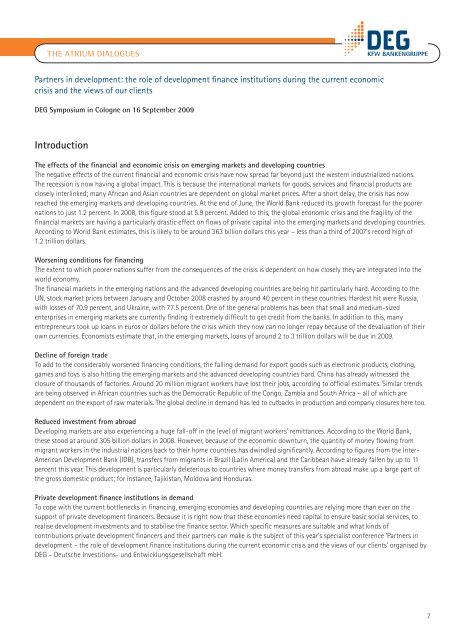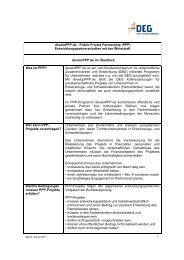We'd love to hear your thoughts. - DEG
We'd love to hear your thoughts. - DEG
We'd love to hear your thoughts. - DEG
You also want an ePaper? Increase the reach of your titles
YUMPU automatically turns print PDFs into web optimized ePapers that Google loves.
The ATrium DiAlogues<br />
Partners in development: the role of development finance institutions during the current economic<br />
crisis and the views of our clients<br />
<strong>DEG</strong> Symposium in Cologne on 16 September 2009<br />
Introduction<br />
The effects of the financial and economic crisis on emerging markets and developing countries<br />
The negative effects of the current financial and economic crisis have now spread far beyond just the western industrialized nations.<br />
The recession is now having a global impact. This is because the international markets for goods, services and financial products are<br />
closely interlinked; many African and Asian countries are dependent on global market prices. After a short delay, the crisis has now<br />
reached the emerging markets and developing countries. At the end of June, the World Bank reduced its growth forecast for the poorer<br />
nations <strong>to</strong> just 1.2 percent. In 2008, this figure s<strong>to</strong>od at 5.9 percent. Added <strong>to</strong> this, the global economic crisis and the fragility of the<br />
financial markets are having a particularly drastic effect on flows of private capital in<strong>to</strong> the emerging markets and developing countries.<br />
According <strong>to</strong> World Bank estimates, this is likely <strong>to</strong> be around 363 billion dollars this year – less than a third of 2007’s record high of<br />
1.2 trillion dollars.<br />
Worsening conditions for financing<br />
The extent <strong>to</strong> which poorer nations suffer from the consequences of the crisis is dependent on how closely they are integrated in<strong>to</strong> the<br />
world economy.<br />
The financial markets in the emerging nations and the advanced developing countries are being hit particularly hard. According <strong>to</strong> the<br />
UN, s<strong>to</strong>ck market prices between January and Oc<strong>to</strong>ber 2008 crashed by around 40 percent in these countries. Hardest hit were Russia,<br />
with losses of 70.9 percent, and Ukraine, with 77.5 percent. One of the general problems has been that small and medium-sized<br />
enterprises in emerging markets are currently finding it extremely difficult <strong>to</strong> get credit from the banks. In addition <strong>to</strong> this, many<br />
entrepreneurs <strong>to</strong>ok up loans in euros or dollars before the crisis which they now can no longer repay because of the devaluation of their<br />
own currencies. Economists estimate that, in the emerging markets, loans of around 2 <strong>to</strong> 3 trillion dollars will be due in 2009.<br />
Decline of foreign trade<br />
To add <strong>to</strong> the considerably worsened financing conditions, the falling demand for export goods such as electronic products, clothing,<br />
games and <strong>to</strong>ys is also hitting the emerging markets and the advanced developing countries hard. China has already witnessed the<br />
closure of thousands of fac<strong>to</strong>ries. Around 20 million migrant workers have lost their jobs, according <strong>to</strong> official estimates. Similar trends<br />
are being observed in African countries such as the Democratic Republic of the Congo, Zambia and South Africa – all of which are<br />
dependent on the export of raw materials. The global decline in demand has led <strong>to</strong> cutbacks in production and company closures here <strong>to</strong>o.<br />
Reduced investment from abroad<br />
Developing markets are also experiencing a huge fall-off in the level of migrant workers’ remittances. According <strong>to</strong> the World Bank,<br />
these s<strong>to</strong>od at around 305 billion dollars in 2008. However, because of the economic downturn, the quantity of money flowing from<br />
migrant workers in the industrial nations back <strong>to</strong> their home countries has dwindled significantly. According <strong>to</strong> figures from the Inter-<br />
American Development Bank (IDB), transfers from migrants in Brazil (Latin America) and the Caribbean have already fallen by up <strong>to</strong> 11<br />
percent this year. This development is particularly deleterious <strong>to</strong> countries where money transfers from abroad make up a large part of<br />
the gross domestic product; for instance, Tajikistan, Moldova and Honduras.<br />
Private development finance institutions in demand<br />
To cope with the current bottlenecks in financing, emerging economies and developing countries are relying more than ever on the<br />
support of private development financers. Because it is right now that these economies need capital <strong>to</strong> ensure basic social services, <strong>to</strong><br />
realise development investments and <strong>to</strong> stabilise the finance sec<strong>to</strong>r. Which specific measures are suitable and what kinds of<br />
contributions private development financers and their partners can make is the subject of this year’s specialist conference ‘Partners in<br />
development – the role of development finance institutions during the current economic crisis and the views of our clients’ organised by<br />
<strong>DEG</strong> – Deutsche Investitions- und Entwicklungsgesellschaft mbH.<br />
7







